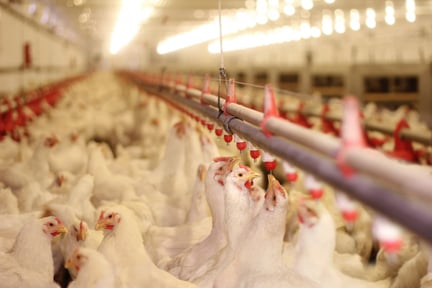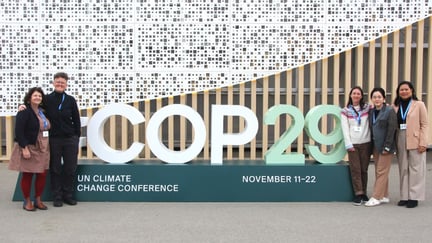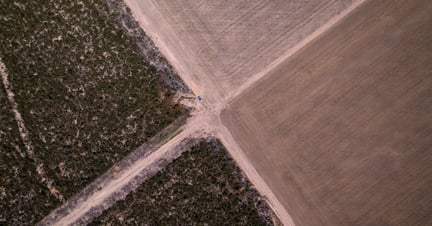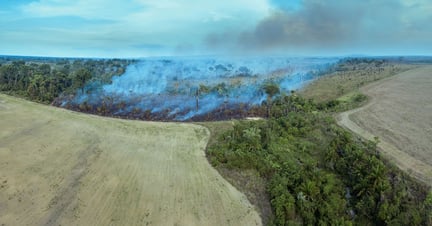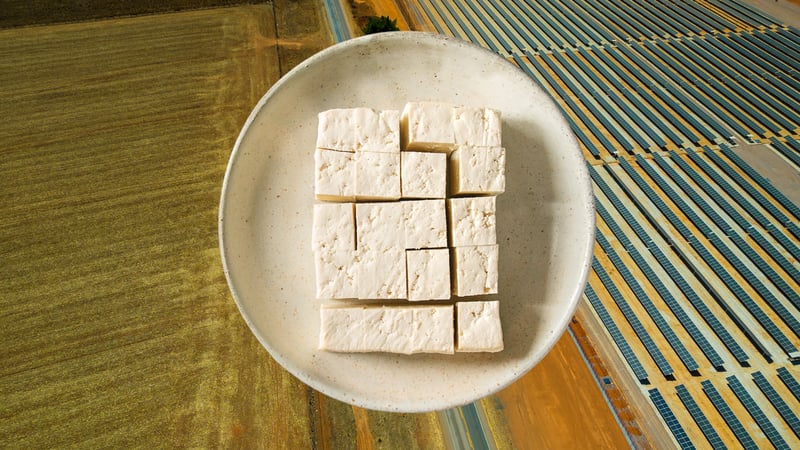
It's a misconception that soy foods and tofu protein are causing deforestation. In reality, 77% of soy produced is used by the farming industry to feed animals.
Loud voices on the internet often criticise soy foods, tofu protein, and vegan diets more broadly, (incorrectly) citing low protein content, environmental impact, and deforestation as reasons to keep eating a meat-based diet. However, these nay-sayers show a fundamental misunderstanding of the issues involved in soy farming. So, we’re here to debunk the myths around soy production, deforestation, and why tofu is, in fact, a more sustainable dietary choice.
Debunking the myths around soy foods and tofu protein
True: Tofu is a good source of protein ✔️
A common Google search is “is tofu a good protein source?” The answer is a resounding yes. Tofu is one of the best sources of protein for vegetarians and vegans because it is a complete protein and contains all of the amino acids — the building blocks of cells that we use to rebuild and repair our bodies — that are essential for life.
In contrast, many plant proteins are typically incomplete because they only contain some of the amino acids we need.
However, tofu is not as rich in protein as some meats. It contains 8.1g of protein per 100g, compared to 32g for chicken and 14.1g for eggs.
False: Meat is healthier than tofu protein ❌
Even those who recognise that tofu is good for you and contains a lot of high-quality protein sometimes argue that meat is a “healthier” form of protein. Often, this is based on the argument that tofu is ‘made’ while meat is more 'natural'.
In reality, tofu protein is a healthier option than meat. It contains less than half the calories of chicken (73kcal per 100g serving, compared to 165kcal for boiled chicken breast) but still provides important fibre, vitamins and minerals for such a small number of calories.
Chicken also contains saturated fats while tofu almost exclusively contains healthy, unsaturated fats. Swapping saturated animal fats for healthier unsaturated fats helps protect your heart and arteries, helping you live a longer, healthier life. ‘natural’.
@worldanimalprotection Replying to @Mary Rose Ship Ending factory farming will: ✔️Free up land for communities ✔️Support global food security ✔️Relieve pressure on wild animal habitats ✔️Stop the cruel suffering of sentient farmed animals #farming #farmtok #farmanimals #wildlife #protection ♬ original sound - World Animal Protection 🌎
True: Soy is mostly produced to feed animals ✔️
Let’s address the question of deforestation directly. It is true that intensive soy farming is leading to deforestation in the Amazon. However, the overwhelming majority (77%) of soy produced across the world is used to feed animals, whether for meat or dairy production.
A further 16% goes towards biofuels, industry, or vegetable oils. Only 7% of global soy production is used for human food products such as tofu protein or soy milk.
As such, the demand for soy that has driven deforestation comes directly from the ever-increasing demand for animal products, while increased interest in meat alternatives hasn’t made a noticeable impact on the environment.
False: Meat is better for the environment ❌
It’s not possible to directly compare the environmental effects of soy foods with meat farming because global meat production relies so heavily on soy production. The environmental impact of meat farming has to include any harm done by soy farming.
Once you realise that meat farming relies on soy feed, it’s clear that the choice isn’t between soy and meat. Instead, we must choose whether we accept the harms of meat farming in addition to the environmental impact of soy production.
This is exacerbated by changes in the choice of meats we consume. Many consumers have reduced their beef consumption in favour of chicken, in part to limit their environmental footprint. Unfortunately, poultry farming is the largest consumer of soy feed.
Meat farming brings unique environmental harm over and above those presented by soy farming. Intensive animal farming is linked to climate change, pollution of rivers through animal excrement, and even the risk of superbugs and pandemics through poor animal hygiene and widespread use of antibiotics.
True: There is no ethical factory farming ✔️
Factory farming isn’t just a source of animal cruelty. It’s the most prolific form of animal cruelty worldwide. Every year, over 100 billion farmed animals are killed for food and almost all of them have lived painful, tragic lives.
Chickens are kept in tiny enclosures, unable to even spread their wings. Pigs are often kept in similarly confined spaces. This causes distress and aggression. They are mutilated during their first week of life by grinding their teeth and cutting their tails to reduce the effects of this aggression.
There is no such thing as ethical factory farming. When you eat factory farmed meats you are fueling animal cruelty.
False: Plant-based diets won't make a difference ❌
When problems are as large and widespread as animal cruelty, deforestation, and food security, it’s easy to think that our individual choices don’t really matter. That can leave us feeling powerless. But our choices absolutely matter.
Choosing to reduce your meat consumption benefits the environment, reduces animal cruelty, alters the economy, and improves your health. Studies suggest that eliminating meat can reduce your risk of cancer and diabetes, for example.
In most cases, meat and other animal products produce more CO2 emissions than comparable plant-based and soy foods. Meat is especially inefficient. Just as we choose to recycle and reduce car journeys to avoid contaminating our planet, we can make better food choices for the environment.
Each person who chooses to reduce their meat consumption makes a tiny difference to the environment and to animal suffering, but enough of us working together can fundamentally reshape the economics of factory farming. Your impact is greater because you’re not alone.
True: There is no future for factory farming ✔️
Factory farming isn’t the solution to world hunger. It’s a key part of the problem. It harms the environment, pollutes land and waterways, and creates the potential for novel diseases. Moving away from meat-based diets is essential for feeding our growing populations.
As more people become aware of the harm caused by factory farming, we anticipate increasing pressure on food producers and governments to halt factory farming. We are also working to limit the export of meat-heavy ‘western’ diets to developing countries.
So, is it better to eat meat or tofu protein?
Tofu protein is a healthy, ethical, and climate-friendly dietary choice — not to mention that it’s incredibly versatile and delicious.
When it comes to a straight comparison between tofu and meat, tofu protein is superior on all criteria. It is better for your health, it doesn’t cause anywhere near the same damage to the environment, and it avoids any need for factory farming and slaughtering animals for food.
We want to add our voice to the long line of doctors, nutritionists, and scientists encouraging everyone to reduce their meat consumption and move towards more plant-based diets wherever possible.
World Animal Protection are working hard to eliminate factory farming and improve the lives of billions of animals every year. Join us.
Header image credit: Noelly Castro / World Animal Protection
Related content
Meat reduction
Food systems
Whether you choose to go vegan, vegetarian or flexitarian, consuming a few animal products can have a big impact on your health, the planet and animal welfare.
No Future for Factory farming
Food systems
Factory farming is a global problem, that requires a global solution. A moratorium on factory farms is urgently needed to safeguard animals, our climate, health and the environment.

